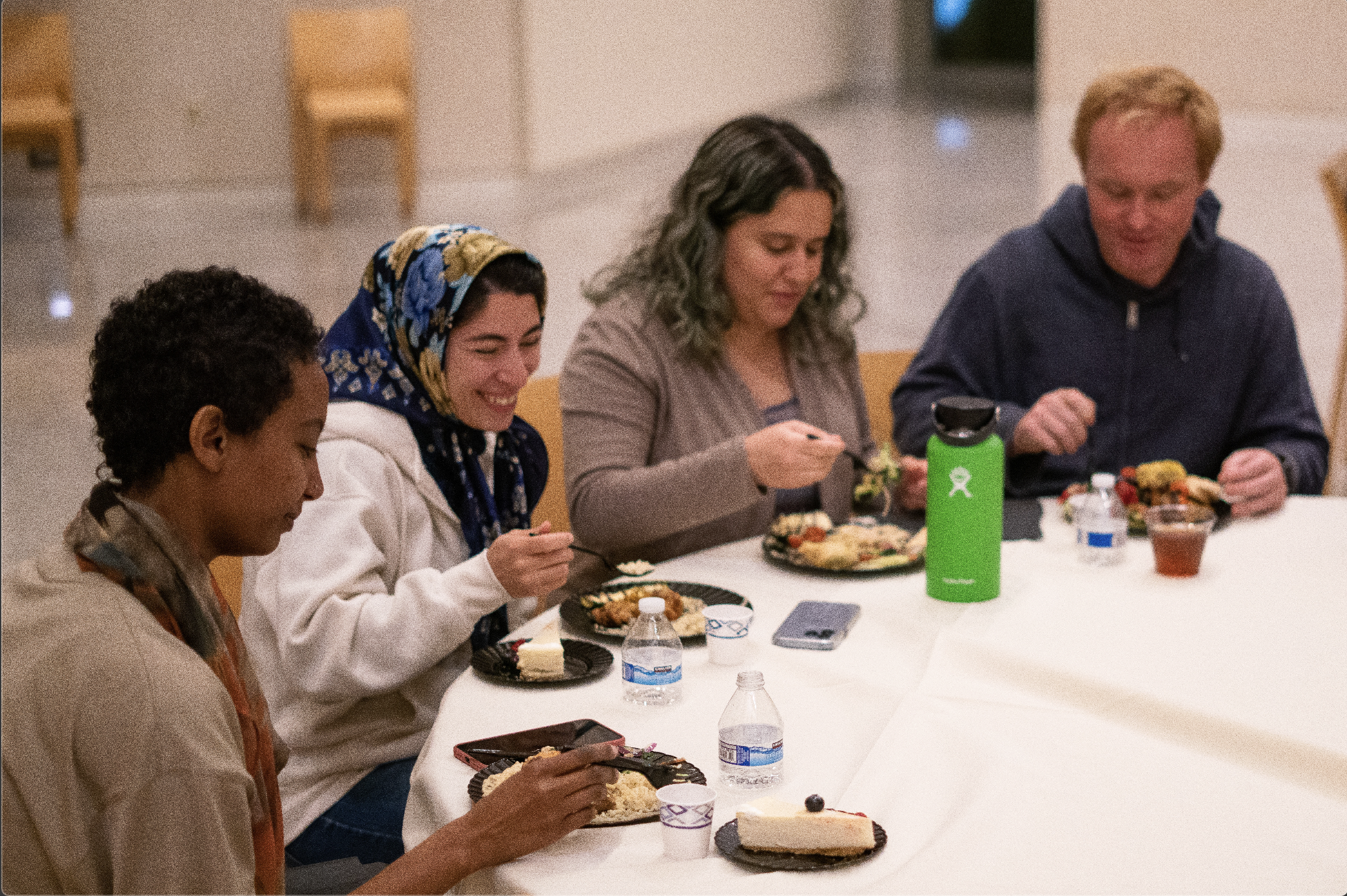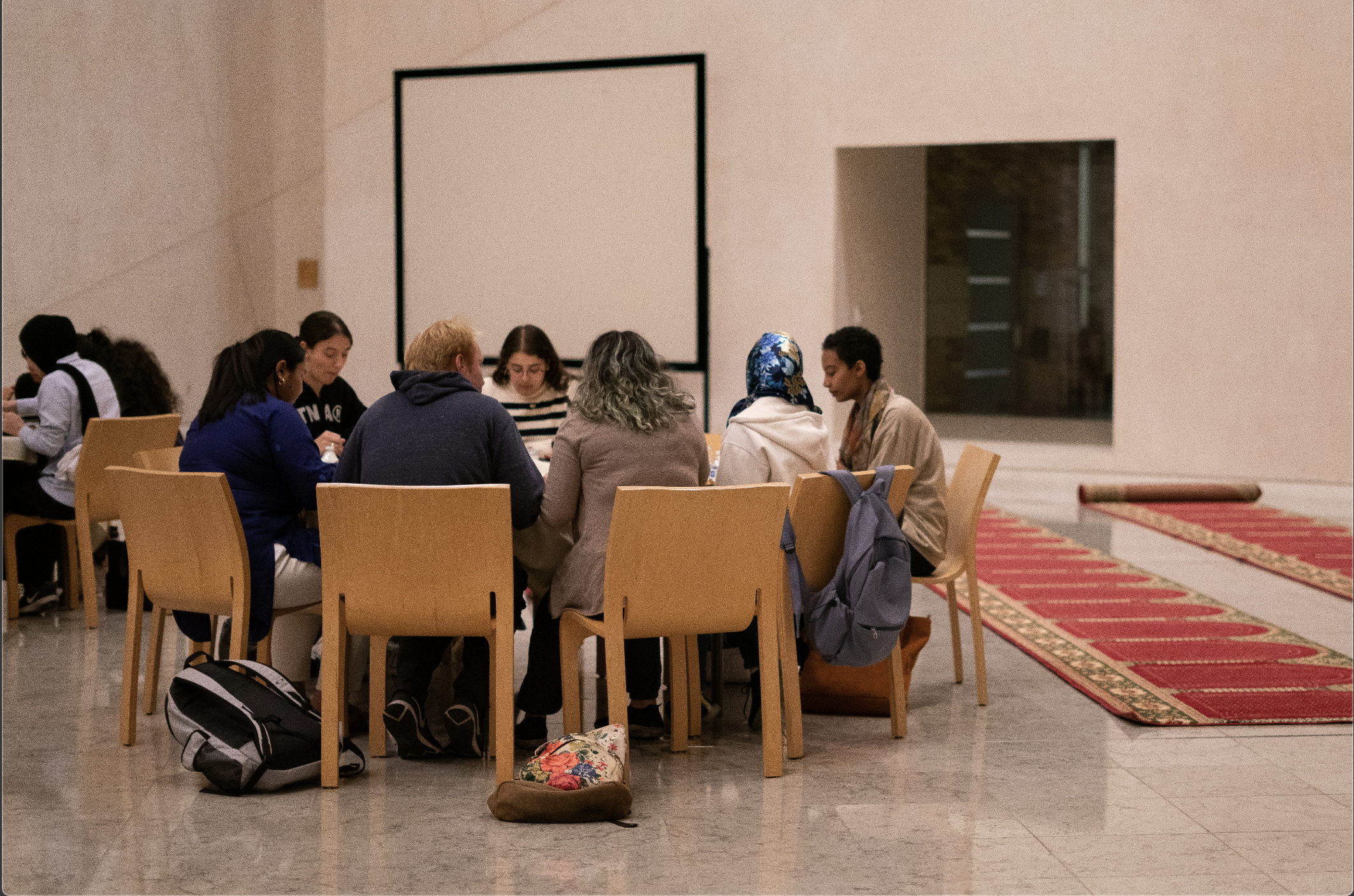Students celebrate Ramadan with after-hours meals at cafeteria, Interfaith Center
The university is providing more resources to support students celebrating Ramadan, such as providing special meals and prayer events in the Fish Interfaith Center. Photos by DANIEL PEARSON, staff photographer
There are more resources than ever for Muslim students fasting during Ramadan.
Chapman University’s Muslim student association (MSA), the Fish Interfaith Center, Residence Life and Sodexo collaborated this year to provide specialized meals to students celebrating Ramadan, a spiritual month in the Islamic faith when people fast.
Ramadan is the ninth month of the Islamic calendar. Muslims believe that the beginning of the Quran, the Islamic holy book, was revealed to the Prophet Muhammad during the time of Ramadan, and therefore, is considered a spiritual month for Muslims.
Those of the Islamic faith participate in fasting and prayer among other activities to get in touch with God during Ramadan.
Students can also break their fast in the Randall Dining Commons, which is open after hours during Ramadan.
Muslims traditionally fast during sunrise to sundown during Ramadan, in addition to elimiting other activities, like cursing, certain music and sexual activities.
The fast lasts every day during hours when the sun is out, and this year, it runs from March 22 to April 20. Some groups are exempt from fasting, including pregnant or menstruating women, nursing women, children, the elderly and people who are sick.
Shaykh Jibreel Speight, the director of Muslim life and a chaplain at the Fish Interfaith Center, explained that the meals follow the Islam lunar calendar. Those who follow it wake up early in the morning to eat before their fast, which is called Suhoor. Then, they break their fast after the sun comes down, called Iftar
“We have a pre-dawn meal, and after that when dawn comes, we pray our dawn prayer, stop eating and drinking, and we fast like I’m doing right now,” Speight said in an interview with The Panther. “The sun sets, and we have what is called a ‘sunset meal.’ In Arabic, it is called ‘Iftar.’”
A recurring problem of Muslim students has been that the cafeteria in the Randall Dining Commons at Chapman is not always open during the times designated for fast-breaking. To provide students who celebrate Ramadan with meals during after-hours, Speight worked with Residence Life and Sodexo to keep the cafeteria open after hours.
“Sodexo put together a way that you can register or request meals every day, and there are certain designated places on campus that you can pick up the meal,” Speight said. “The most important thing is that the food falls within the parameters of what is considered Islamically acceptable, and that was a big issue because not every spirituality and religion eat the same. We have what is called Halal, and that means that the meat has been slaughtered in a certain way in a certain manner per Islamic standards.”
This Ramadan is the first year that high-quality meals are provided after-hours and the second year that the Fish Interfaith Center is hosting events such as Iftar.
“This is a vast improvement from what it was last year,” Speight said. “It was great to see these four entities come together to really show a greater interest and greater concern for the Muslim population that we have. I think that such efforts speak volumes of the attempt that Chapman is trying to make to really respect people's identities.”
Miriam Alkayali, a junior at Chapman studying psychology, said that the Muslim Student Association helped to provide resources for Ramadan by gathering information from Muslim students at Chapman.
“I asked everybody who's on campus who needs meals such as the pre-dawn meal and who needs Iftars for the days we don’t have it, so we were able to get a number, and I gave that information to the Shaykh,” said Alkayali, who currently serves as the president of the MSA. “From there, he coordinated with Resident Life.”
MSA is celebrating Ramadan this year by holding info sessions at the Fish Interfaith Center, Iftar and Suhoor meetings, group prayers and a celebration of Eid, which is a holiday that marks the end of Ramadan.
“Ramadan is important to me because it's a month where I get closer with God,” Alkayali told The Panther. “Especially being in America and a western country, it’s kind of hard. So, I’m able to pray to God (and) ask for forgiveness. It’s really cool to see the community come together.”
Because of the previous challenges students have faced at Chapman, Alkayali explained that the rewards of Ramadan mean more.
“It’s hard working and going to school because there’s no food or water in our system, so it’s kind of hard to have the energy,” Alkayali said. “The most rewarding thing is breaking our fast because we just pushed through the whole day. This month is kind of like a test to our patience because we don’t have food or water. So it’s kind of like to love everyone, to be patient and to be together in the community.”
Laila Makrom, a freshman biology major, has been in the MSA since the beginning of the school year. She told The Panther that during Ramadan, she focuses on her connection to the community.
“I personally celebrate Ramadan by trying hard to pray as a community with others instead of alone and by inviting fellow Muslim friends to my house so that my family and I can cook for them, and we can all be together as a community in this holy month,” Makrom said.
Makrom has a meal plan at the Chapman cafeteria, and she also utilizes the food ordering program. However, she told The Panther that before the food program had begun, she had already started her fasting.
“Before Ramadan, many Muslims have to make up additional fasting days to compensate for any days not fasted from the previous year’s Ramadan,” Makrom said. “So before MSA did this amazing food-ordering program, I had to make up six fasting days from last year and would need to get the to-go meals from the cafeteria.”
Although Makrom said that she finds Ramadan challenging at times, the challenges bring the Muslim community together.
“The most rewarding part of Ramadan is the community that it establishes,” Makrom told The Panther. “There’s something very soothing about knowing that every Muslim in California right now is fasting together at the same exact time. It’s so rewarding to feel included and understood. It helps us bond.”


